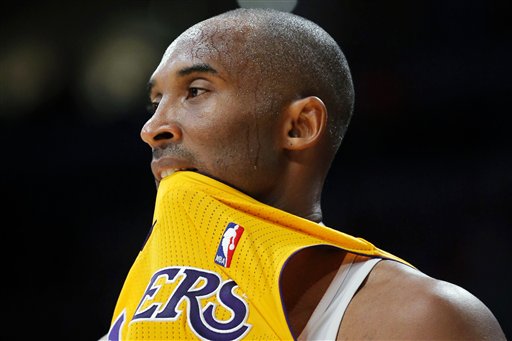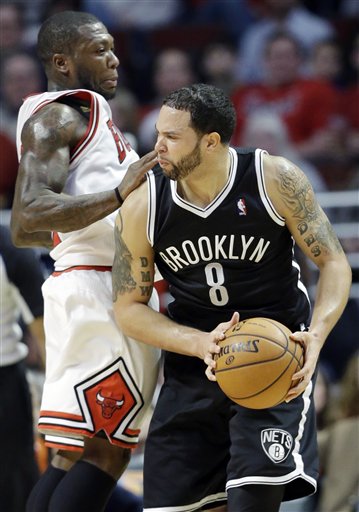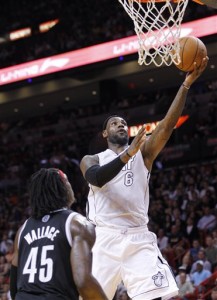| Next: Joe Johnson |
By the numbers: 78 G, 78 GS, 36.4 MPG, 18.9 PPG, 7.7 APG, 3.0 RPG, 1.0 SPG, 0.4 BPG, .440 FG%, .378 3P%, .859 FT%, .574 TS%, .516 eFG%
Advanced: 20.3 PER, 118 ORtg, 109 DRtg, 24.4 USG%, 1.2 ORB%, 8.5 DRB%, 4.8 TRB%, 37.5 AST%, 1.4 STL%, 0.8 BLK%, 13.3 estimated wins added
The New Jersey Nets traded for Deron Williams on a whim in February 2011, gambling that he’d want to be the face of the Brooklyn Nets. After 18 months slogging through Newark, Williams signed a maximum five-year contract with Brooklyn in the offseason, eschewing Dallas Mavericks owner Mark Cuban in favor of making a home in Brooklyn (except that he lives in Manhattan).
But Deron Williams was more than just the face. Williams exemplified everything simultaneously sublime and substandard about this team: flashes of untempered brilliance mixed with moments of pure frustration, seemingly unable to hit that “next gear” that Brooklyn sometimes desperately needed.
It was a Hyde-and-Jekyll season for Williams, one that began with Williams playing through crippling pain in his ankles and getting undeserved game balls from Avery Johnson, ending with him throwing down double-pump reverse jams in the playoffs.
The All-Star break is often cited as the turning point, thanks to the week-plus of rest, three cortisone shots, platelet-rich plasma treatment, and detoxifying juice cleanse Williams underwent, but his resurgence truly began in January; from the calendar year 2012 to 2013, Williams upped his points per game (16.3 to 20.6), assists (7.5 to 7.9), field goal percentage (39.9% to 46.5%), three-point percentage (30% to 42.2%), and free throw percentage (81.5% to 88.4%).
WATCH: The Top 10 Deron Williams Plays of 2012-13
He dazzled. He hit nine three-pointers in one half against the Washington Wizards, setting an NBA record. He activated the Mark Cuban Struggle Face. 11 of his biggest 12 scoring nights came after the new year. He developed a two-man chemistry with Brook Lopez that resulted in more easy points than Lopez had in his entire career. His ankles, the same ones that once “felt like s—,” looked like new. He ran an offense that scored 108.9 points per 100 possessions with him on the floor in 2013, which would rank as the third-best offense in the league over the course of a full season.
As Williams went, Brooklyn went. At his best, he scored in profuse amounts by balancing a basket attack with three-point acumen, ran a comfortably simple offense that got open looks for himself and others (particularly Brook Lopez around the rim), and adjusted his strategies on the fly with a rapidly changing rotation. At his worst, Williams eschewed these same principles (particularly in the third quarters), relying heavily on one-on-one basketball in moments that the Nets needed a five-on-five approach.
At times, his frustration seeped over. He criticized Avery Johnson’s offensive system a little over a week before Johnson was let go.
Williams is 28 now, and will be 29 before next season starts. He is, for all intents and purposes, the player he’s going to be. If that player is the Williams the Nets enjoyed in the second half of the season, when Williams was finally healthy, Brooklyn’s going to rock. If the Nets sign a coach who can maximize his talents, the Nets should improve substantially on this year’s playoff run. But Williams isn’t turning into a different player overnight.
WATCH: Deron Williams crossovers, before and after the All-Star break
What Deron Williams represents isn’t just himself, but the core Brooklyn’s locked into. It’s hard not to call Brooklyn’s inaugural season a success — a 26-win improvement (albeit in a longer season, but still), a seven-game loss in a tough first-round matchup — but it wasn’t a wild success. It was good, but not great. Williams is at the center of that. The Nets may have signed Williams to be their face, but Williams is the Brooklyn Nets: real flash, real substance, high-priced talent on the cusp of superstardom but still brushing below it, with little chance of breaking into the next echelon.
—
HIGH POINT: Setting the NBA record for three-pointers in a half against the Washington Wizards. I was sitting with Nets announcer Ryan Ruocco at the arena that night, and he can confirm I spent the entire first quarter — when Williams hit six three-pointers in 4:45 and seven overall — just laughing.
LOW POINT: Hitting just one field goal in nine attempts — his lowest output in any game this season — in Game 2 of the NBA Playoffs against the Chicago Bulls in a 90-82 loss. Williams had worse overall nights, but none came in such a big moment, immediately following a Game 1 Brooklyn blowout victory. Put it this way: in that game, every Bulls player except Jimmy Butler hit more field goals than Williams, and Butler matched his one.
ONE FORGOTTEN MOMENT: Williams got into an altercation with Wizards guard A.J. Price in a preseason game at Barclays Center, yelling “this is my house” at Price as he pushed him away. Williams after the game: “Maybe he had some boys in the crowd he wanted to impress while he can with the little minutes he’s going to get this year.”
MY FAVORITE MOMENT: The Game 1 dunk. Let me try to set a scene for you. I’m at a family event in Boston covering the game, so dozens of family and friends are on the first floor partying, eating, and dancing. I’m on the second floor sitting in a rocking chair — because that’s all that was available — staring at a 50″ plasma television, frantically taking notes on what’s quickly becoming my favorite game of the season.
I’m torn. On the one hand, I have a strong impulse to spend time with my family in this very personal time. I feel like a child left alone to play with toys while the grownups have their weird adult fun. On another, it’s the first playoff game in Brooklyn Nets history and they’re blowing Chicago out. I’m thinking about how early I can finish writing (look, they were up 25 in the third quarter) and get downstairs to spend time with my sister.
Then Deron Williams rips the ball out of Luol Deng’s hands and breaks upcourt.
And everything I’d been thinking about — whether to finish up, where to go, what to do — completely evaporated for those few glorious seconds. Because holy wow, Deron Williams just threw that down.
It wasn’t the best dunk of his career or anyone else’s. It wasn’t Gerald Green’s perfect windmill or anything like that. It was, from the outset, a pretty routine spectacular dunk: a double-pump reverse jam. It wouldn’t get a 40 at a dunk contest. But after everything Deron Williams went through this year, after every annoying question about if he was done or if his ankles were shot or if he could even really dunk more than once per season anymore, that dunk functioned as immediate, glorious catharsis.
Some moments make you forget everything. That’s part of why I watch basketball, to get lost in those moments. When real life weighs, a 6’3″ point guard with weird hair and ankle issues can enrapture merely by adding an exclamation point on a hell of a sentence. If only for a brief moment, everything else melts away.
It was an unforgettable moment. Williams isn’t perfect, the dunk wasn’t phenomenal, and he’s not evolving. But that instant replay, with the stadium lighting shining through the hoop as Williams flushes the dunk down, is frozen in memory forever. Nothing can take that away.

| Next: Joe Johnson |
Full List:
Deron Williams | Joe Johnson | Gerald Wallace | Reggie Evans | Brook Lopez | Andray Blatche | C.J. Watson | Keith Bogans | Kris Humphries | MarShon Brooks | Mirza Teletovic | Tyshawn Taylor | Tornike Shengelia


















